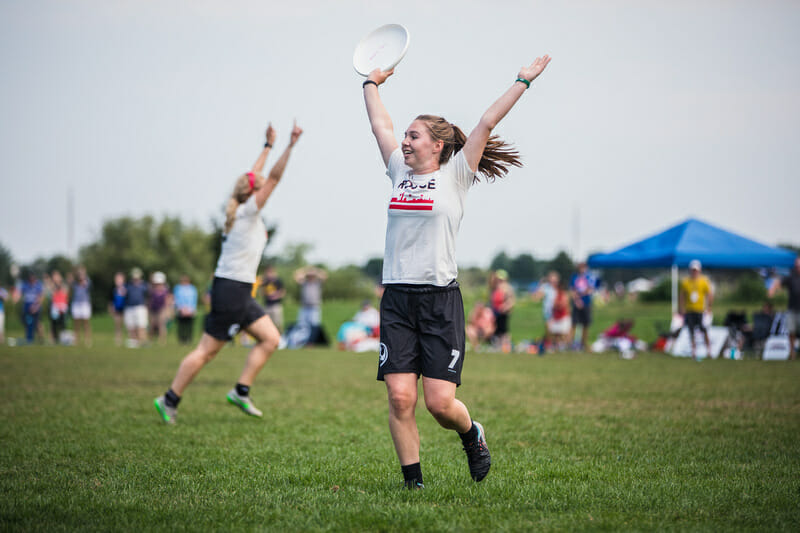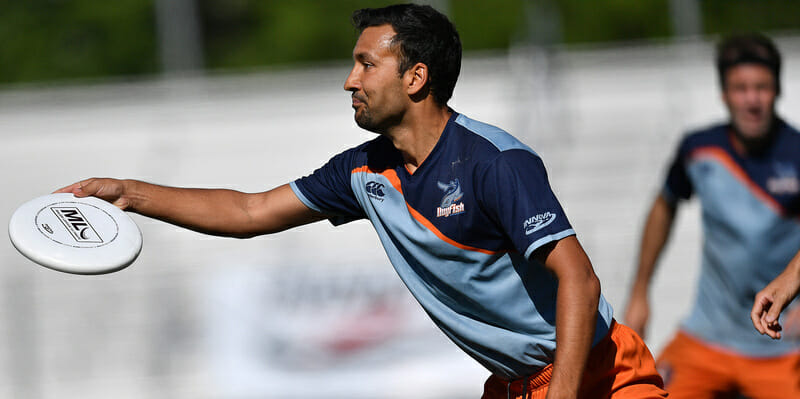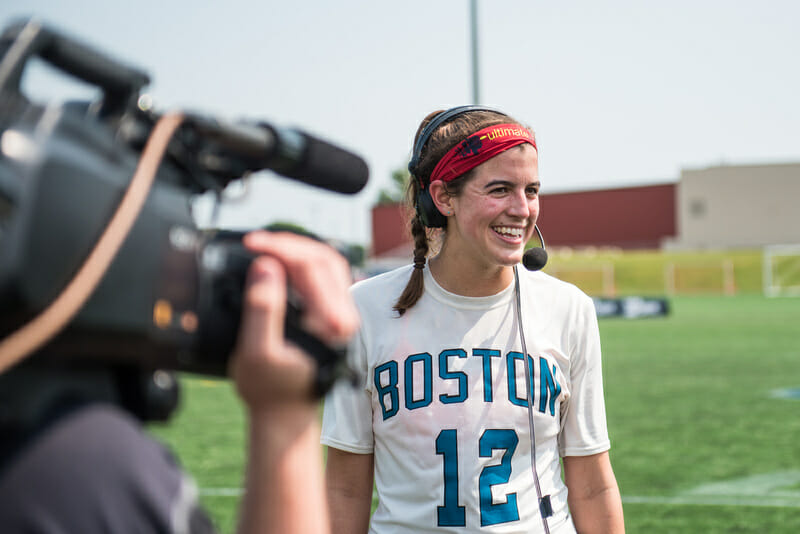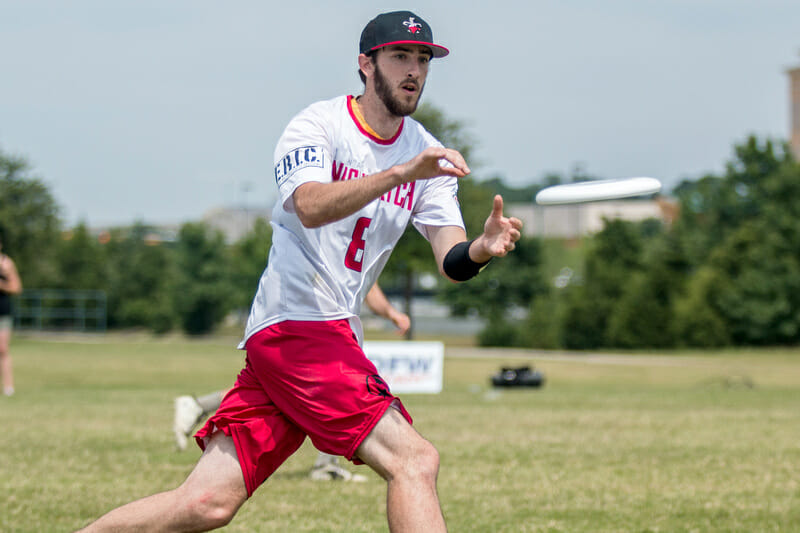For many, making Club Nationals is a career-defining moment. Here are some of their stories.
October 17, 2018 by Patrick Stegemoeller in Profile with 0 comments
The USA Ultimate National Championship is the highest caliber tournament in the world, an unrivaled display of talent and competition producing spellbinding contests and heroic performances. But more than just a setting for great moments and games, it’s a key experience in the lives of the players who devote themselves to reaching it. It can be the start of an exciting career or the culmination of one, but the first time a player makes it to Nationals is always special.
Many players will be arriving in San Diego this weekend for their first Nationals. Some may have a big impact on the most important games, but many will not. However, it doesn’t represent the full experience and significance of Nationals to only talk about what happens on the field. How the players got there and what the tournament means in the context of their careers and in their lives fuels the passion and drama that makes the event so meaningful.
Here is a brief look a four players who will be competing at Club Nationals for the first time, and why it matters to them and everyone else who takes the field.
Caroline Tornquist (Washington D.C. Scandal)

You have to be a driven individual to put in the time, sweat, and emotional investment it takes to make Club Nationals. At the start of Caroline “CT” Tornquist’s career, she literally had to be driven to practice, by her mother, because she was only 15 years old. Now, a relatively wizened 18, Tornquist will be playing at Club Nationals before she plays her first game of college ultimate. If this is your first time reading her name, it likely won’t be the last.
License aside, Tornquist has seemingly always found herself in the driver’s seat during her playing career. Varsity from the start at HB Woodlawn High School, where she picked up a High School National Invite title in 2017. Her YCC trophy case is bursting, with two gold and two silver medals in four years of competition. Another gold medal at WJUC this summer rounds out the set, marking her high school, YCC, and international accomplishments.
CT had more career highlights before she went to college than many players get in their whole career. But Club Nationals is a new frontier. For someone who has seen and done so much already, the intensity of playing at this level is still eye opening even if it’s something she has been envisioning for years.
“Club Nationals has always been the dream,” said Tornquist. “It’s the pinnacle.”
Playing with Scandal for the first time this season after graduating from D.C.’s second team Grit has given Tornquist the chance to push her game, and this weekend it will be pushed even further. “YCC and all that is fun, and a great experience, but it’s just not the same talent level,” she said. “Not the same challenge.” For CT, Nationals isn’t just an opportunity to take the field against some of her idols, its a chance to feel how a game that she has thoroughly explored still has so much more to offer.
Many veteran players frame Nationals as an ending. Climactic moments that put to rest another chapter of a career, whether in victory or defeat, in joy or in sadness. It’s a culmination of a season spent preparing for a single weekend, or sometimes a single game, that will color the whole year.
But for the boundless young talent of someone like Tornquist, Nationals is a beginning. It’s a moment to see what her future may hold, what heights this sport is capable of allowing her to reach. She may be only approaching the pinnacle at this stage in her career, but the experience this season and the trip to San Diego will accelerate her rise. Nationals will give her the keys.
Raj Maitra (San Francisco Blackbird)

Say what you will about the tenets of neoliberalism, but at least it’s an ethos.
Raj Maitra has embodied basically every bootstrap pullin’ up, adversity overcoming, “the free market should decide who goes to Nationals” platitude you can imagine. But his career exceeds mere cliche and demonstrates what this sport can offer to people who dedicate themselves to it.
Raj started playing club in 2012 with a squad formed from his UC Santa Cruz teammates, the “Slug Club.” It was quite a road from there to Nationals, filled with disappointment, resilience, and, finally, vindication.
Moving up the club ranks in the fiercely competitive Bay Area scene can be difficult, and getting cut from teams is part of the deal. Raj felt that acutely as he tried to work his way up from an anonymous college player to a face in the community. Amidst the many tryouts and teams over the years, one that really stuck in his craw was getting cut from Boost Mobile. He had friends on the team, he knew some of the captains liked him, he played well at tryouts, and yet…
But that pain turned to motivation. Along with his college friend Greg Cohen who had just made Revolver, Raj rededicated himself to the game: 6 AM workouts three times a week, as much goalty, beach, and mini as he could play during the offseason, all with an eye on reaching his potential and getting the chance to prove he belonged. There were positive steps, making the MLU’s Dogfish and the Flamethrowers in the AUDL, but club success eluded him.
After going back and forth between the mixed and open divisions, in 2018, Raj set his sights on making Blackbird, a premier mixed team in the Bay Area. The tryout process dragged on into the summer and Raj found himself on the bubble as either one of the last to make it or the last to get cut. Finally, deep into June, he got the call. Blackbird was going to roster him.
“It was a pretty crazy feeling,” said Maitra. “It felt like all the hard work I put in was paying off.”
While Raj’s teammates were planning on going to Nationals all season, he wasn’t allowing himself to think about it until the moment it happened. After winning Sectionals, he got a “bubbling feeling” that he tried to put in the back of his mind by working as hard as he could in preparation for Regionals. His caution may have been wise, as Blackbird had an unexpectedly rocky Regionals and found themselves facing elimination in a game-to-go to Nationals.
In the huddle before the game, he looked inside himself and pulled out the same thing that had got him to that point. “I told myself that no matter what, I was going to work my ass off that game,” he said. “On the field, on the sideline, the whole game.” He did just that, and his team took care of business with a convincing 15-8 win.
“Once it hit me, I couldn’t say anything,” he said. “I broke down crying in the arms of a veteran on the team.”
One of the first people to come over to the field and embrace Raj was a former Boost Mobile captain who had cut him, now saying how proud he was. The moment was a true culmination. “It all came back to me at once,” he said. “How long I had been working to put myself into that position, of finally being a legitimate player.”
In the eyes of anyone who knew him, knew the work he had put it, Raj was already a legitimate player long before that last point at Regionals. They would tell him that those 6 AM workouts, that love of the game, that refusal to take no for an answer, said more than any result. That he had been seen as a real part of the community for years. I guess it’s nice that now he finally sees it too.
Nicole Canning (Boston Brute Squad)

Nicole Canning found ultimate the way most people do. As a college sophomore at Northeastern University, she picked up the sport to supplement her lacrosse training. Soon, lacrosse was put aside and ultimate became her primary passion, time suck, and source of joy. “It was the community at Northeastern that really grabbed me,” she remembers. “The team and the sport were all about celebrating what we were capable of doing, and I loved that.”
To scratch her new itch, she began playing club during the summer, at first with a local team called Vice and the following season with Siege, a new team from Boston.
“We literally had nine players at our first tournament,” Canning said, describing the start of Siege. “But it was so much fun.”
While getting her start at the entry level positions of club, she was introduced to the highest level of the sport by some teammates and friends who played for the Northeast mixed powerhouse The Ghosts. Their experience at Worlds and playing high stakes games at Nationals seemed like a totally separate world to Nicole, one that ran in parallel to the one in which her playing career existed. “I wasn’t someone who had been dreaming about going to Nationals from the beginning,” she said. “Not being at a Nationals level at first wasn’t a negative for me, because it was never something that I thought was ever really an option!”
While Nicole may not have had had her mind on Nationals right away, her talent would soon bring it into her orbit. She helped take Siege in its first Regionals to the game-to-go to Nationals, which Canning described as illuminating. “It wasn’t until after that game that making Nationals even seemed like a possibility,” she said. Worlds had collided, when her career and the experience of the people she had looked up to seemed to exist in the same universe, at least for a moment.
It still took another few years for Nicole to fully embrace her potential, even while she committed more and more of herself to the sport. Siege continued to go deep at Regionals with Nicole playing a big role, and she was developing a reputation for being a serious threat in the air along the way. But it took several Brute players actively recruiting her this season to even get her to tryout for the team. “I honestly never thought that I was someone who could be on Brute Squad until this season,” she recalled. “Until they asked me to come play with them.”
Nicole made the team, and after a summer of playing at the highest level of her career, finally crossed the line to official Nationals player when Brute Squad won the Northeast Region in September.
“It wasn’t until after we won that I really started to think about how I was going to Nationals,” she recalled. “I started to get really excited, and then realized that I was the only person on the team who had never been before.” It was a strange, happy scene she described, with veterans who had been to Nationals so many times before rediscovering some of the joy of the first trip in Nicole’s dawning recognition that she too would be going.
For Nicole, ultimate has been a steady progression of doors opening to her that she didn’t even know were there. And now one of the biggest has opened, which she’ll step through when she takes the fields in San Diego this weekend.
Player Pierce (Atlanta Chain Lightning)

There are many different paths towards Nationals — some that arrive quickly, some that take a whole career, and some that never get there at all. For Chain Lightning’s Player Pierce, it took taking a step back from obsessing about making Nationals to finally get over the hump.
Pierce made his first game to go in 2011. It was his second season on the club circuit, playing with a Chattanooga outfit by the name of Nooga by Nature. He also made his second game to go in 2011. Nooga blew consecutive shots to go to Nationals, ending their season a few points from glory. Pierce was disappointed but not distraught. He’d gotten so close in only his second year of playing, surely he’d get the job done next season or worst case scenario the season after that.
Player Pierce made his third game to go in 2018.
“It was hard, starting off with that expectation of success and then not reaching it for so long,” he said. “After that 2011 season, the goal was Nationals and a year of not getting to the game to go was not a success.”
The frustration of failing to reach his definition of success drove Player to improve his game, but he struggled to cope with the season ending losses and the lack of control any one player can have on the outcome of a game or a season.
“It was toxic. I became toxic in a way,” he said, looking back on the past few years. Not making Nationals was affecting the way he approached the game and his teammates. He found himself unable to look beyond the failure.
Needing a change of scenery, he journeyed all over the South chasing the success he craved. Commuting from Chattanooga to Nashville, Kentucky, and North Carolina to play in the AUDL and with various club teams, he gained valuable experience on the field but, even more crucially, insight off of it. “After the 2015 season, I realized that I had been focusing too much on results,” he said. “I needed to focus on bringing my teammates up, improving my own game, instead of the end of the year finish.”
The next season, in which was recruited out to Durham to play with Turbine, was one of the most fulfilling of his career. And while Turbine got knocked out of a one bid region by Ring of Fire, the recipe was now clear to Player. In order to enjoy the results he wanted, he needed to let go of his obsession with them. He became a better teammate, a better player, and someone who was ready to see the big picture.
Pierce’s growth culminated this season when his playing tour of the South led him to Atlanta and Chain Lightning. He not only got back to that game-to-go, he finally made Nationals. Something that seemed easily attainable at the start of his career became so much sweeter when finally secured after years of struggle.
“You need to be willing to make some hard choices,” he said, reflecting on his earliest club seasons. “To leave a team with a lot of your friends on it and follow the path to your success.
“But it’s worth it, it’s worth it to get there.”